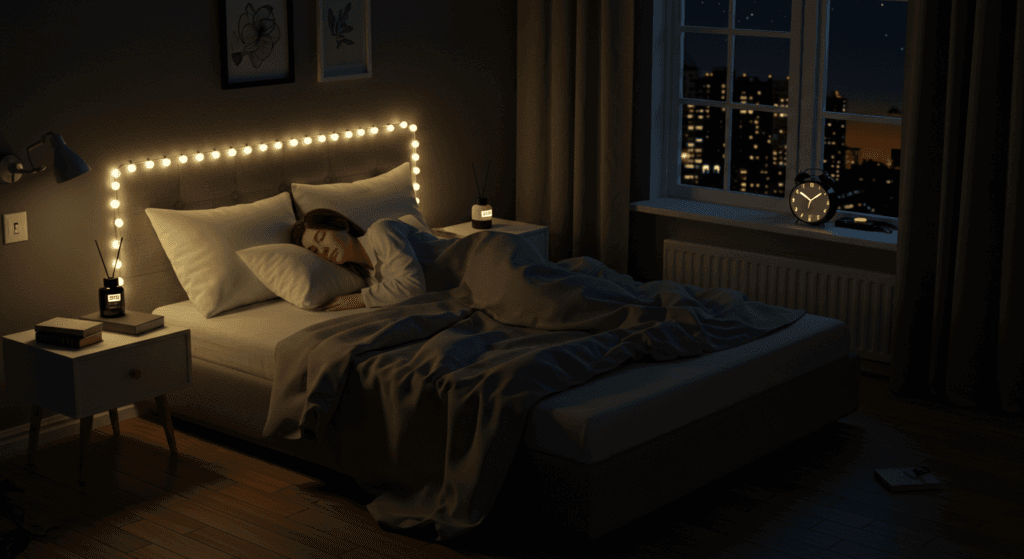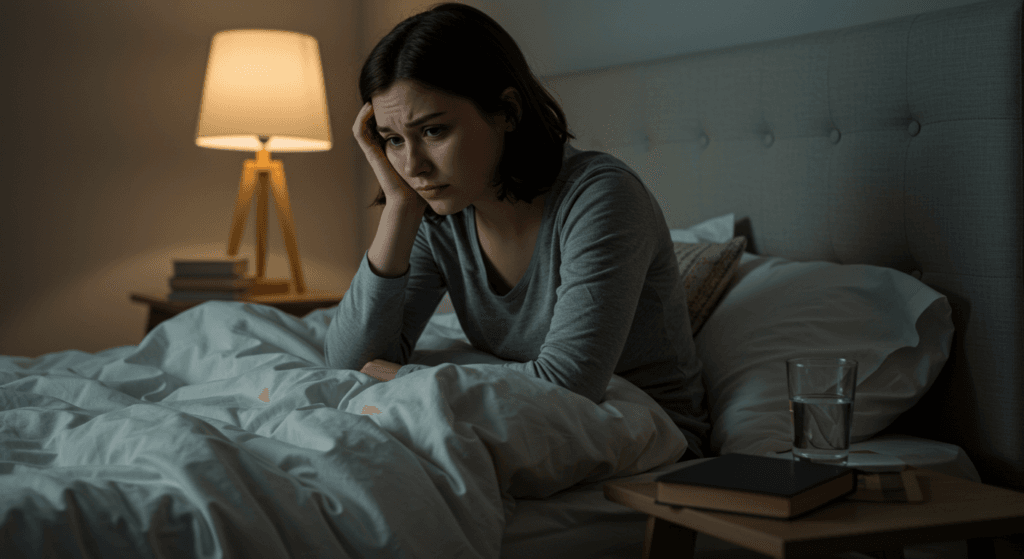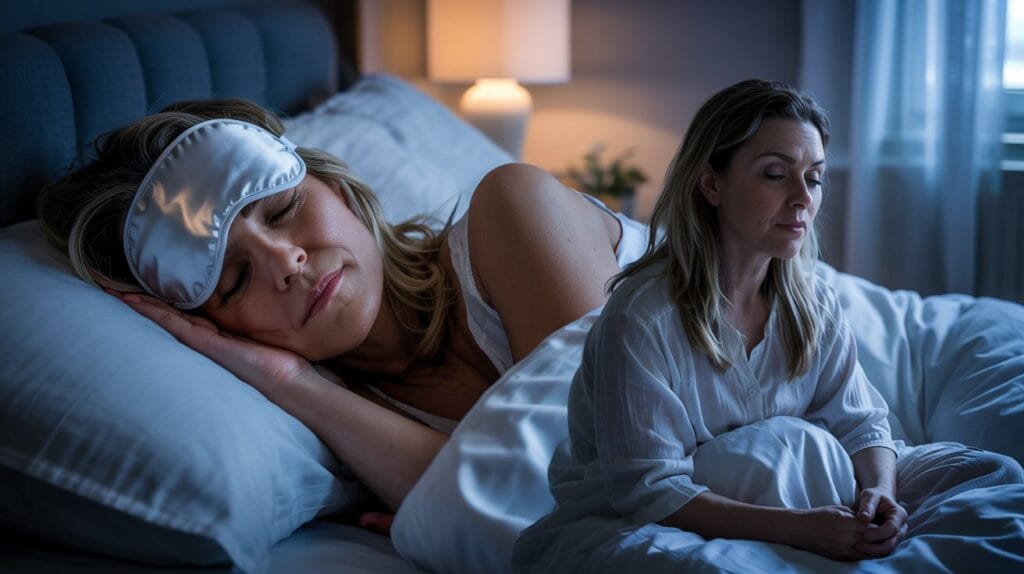
Ever lie wide awake at 3 a.m., staring at the ceiling like it’s Netflix, while your brain’s yelling, “Why can’t I just improve sleep already?” Same, friend. Tons of us wrestle with shut-eye—whether it’s taking forever to crash, waking up every hour like clockwork, or dragging ourselves out of bed feeling like we ran a marathon in our dreams¹.
But here’s the kicker: Nailing down how to improve sleep isn’t just about counting sheep. It’s a total lifesaver for your mood, energy, and basically… everything. And guess what? No confusing medical terms here – just practical tips that work. Another sleepless night? Let’s change that for good.
Let’s cut to the chase with real-deal tips to hack your sleep mojo, so you can finally bounce out of bed ready to crush it. We’re spilling the tea on easy-peasy sleep hygiene upgrades (no, it’s not just fancy talk for clean sheets), why melatonin’s⁵ the OG sleep sidekick, and natural fixes to shut down insomnia vibes.
What’s the perfect nighttime routine to improve sleep?
Let’s get real: The secret sauce to improve sleep starts with nailing your sleep hygiene game. Yeah, sleep hygiene sounds like a fancy term your yoga instructor drops, but really? It’s just daily habits that prep your body for killer zzz’s. Think of it like hitting snooze—those small, consistent moves that flip your brain’s switch to chill mode.
The Nightly Routine That Finally Fixes Your Sleep:
- Stick to a schedule like glue: Hit the hay and rise at the same time daily—yes, even weekends. Your body’s a creature of habit¹ (no wild Friday night exceptions, sorry).
- Pamper your pre-bed vibe: Swap Netflix marathons for a chapter of that book collecting dust, a gentle yoga flow, or vibing to lo-fi beats. Your brain needs these cues to unplug.
- Nap smarter, not harder: If you’re dying for a midday snooze, cap it at 20 mins² (think power nap, not hibernation) and do it before 3 p.m.
- Turn your bedroom into a sleep cave: Cool as a cucumber, tomb-quiet, and darker than your ex’s Insta feed.
Pro tip: A good mattress that supports you properly makes all the difference.
How can I fall asleep faster naturally?
Okay, let’s break down melatonin—it’s like your body’s personal sleep DJ. This hormone runs the show when it comes to your sleep-wave rhythm, nudging you with a “Psst… lights out, buddy!” When it’s time to power down at night or spring into action in the morning. But how does it actually improve sleep quality? Here’s the deal:
- Fast-tracks your trip to dreamland: Night owls, rejoice! A small dose of melatonin can gently reset your inner alarm clock—helping you actually fall asleep when you need to.
- Many people who use melatonin stick to microdoses — usually around 0.5 to 3 mg — taken 30 to 60 minutes before bed, based on what works for them.
- Works for some, meh for others: Melatonin’s kinda picky—it’s a hero for some, a dud for others.
Heads up: Don’t go popping these like candy without looping in your doc first, especially if you’ve got health stuff brewing in the background. Better safe than zonked, right?
Does blue light really ruin your sleep?
Let’s face it: We’re all glued to our screens 24/7—scrolling, those just one more episode marathons, or doom-Googling “why am I tired all the time?” at 2 a.m. But here’s the plot twist: That sneaky blue light beaming from your devices? It’s basically a sleep saboteur.
Blue light messes with your brain’s internal clock by suppressing melatonin. The result? Your brain’s stuck in “sun’s out, buns out” mode when it should be winding down. No wonder you’re tossing like a rotisserie chicken at midnight.
Wanna fight back? Try these hacks:
- Unplug like it’s 1999: Ditch the screens at least an hour before bed.
- Flip on night mode: Your device probably has a night mode setting to cut blue light – find it!
- Rock those blue light blockers: If late-night work or scrolling can’t wait, grab a pair of those glasses. Think of ’em as a bodyguard for your peepers—blocking harsh blue light like a pro.
How can I kick insomnia naturally—without popping pills?
Let’s face it – insomnia is that unwanted guest who barges in at 3 AM and refuses to leave. But before you reach for sleeping pills, here’s the good news: Mother Nature’s got your back with some seriously effective solutions.
Your anti-insomnia toolkit (no pills required):
- Give your brain a spa day: Try box breathing³ (inhale for 4, hold for 4, exhale for 6) or a body scan.
- Sip on nature’s chill pills: Brew a cup of chamomile⁶, valerian root, or lavender tea.
- Ditch the after-dinner espresso martinis: Both caffeine and booze sabotage deep sleep. Try tart cherry juice instead⁴.
Take Sarah, a teacher who replaced her after-dinner wine with chamomile tea and started doing body scans in bed. Within two weeks, she went from lying awake until 2 AM to falling asleep naturally within 30 minutes.
Can exercising at night affect my sleep?
Daily movement = sleep magic. Whether it’s gentle yoga, a quick walk around the block, or finally organizing that disaster of a closet – it all counts! Just wrap it up 3–4 hours before bed—unless you wanna feel like you chugged a Red Bull at midnight.
Disclaimer: This is info, not medical advice. Got questions about your health? Your doctor knows best—check with them before trying anything new.
Key Takeaways
- Sleep isn’t a luxury. It’s fuel. Get yours.
- Chill out before bed, every night.
- Your bedroom should feel like a cave, not a nightclub.
- Melatonin’s a tool, not a magic fix.
- Natural habits can beat insomnia—no prescription needed.
If you found this article useful, share it with a friend and subscribe to our free newsletter at the bottom of the page so that I can send you more hacks for better zzz’s.
Note: Some stories shared in this blog are fictional composites inspired by everyday challenges. They’re designed to illustrate relatable situations and helpful solutions while respecting privacy.
References
- Sleep Foundation. “Circadian Rhythms and Sleep.” Available at https://www.sleepfoundation.org/circadian-rhythm
- Mayo Clinic. “Napping: Do’s and don’ts for healthy adults.” Available at https://www.mayoclinic.org/healthy-lifestyle/adult-health/in-depth/napping/art-20048319
- National Library of Medicine. “Relaxation Techniques.” Available at https://www.ncbi.nlm.nih.gov/books/NBK513238/
- National Library of Medicine. “Effect of tart cherry juice.” Available at https://pubmed.ncbi.nlm.nih.gov/22038497/
- National Institutes of Health. “Melatonin: What You Need to Know.” Available at https://www.nccih.nih.gov/health/melatonin-what-you-need-to-know
- National Center for Complementary and Integrative Health. “Chamomile: What You Need To Know.” Available at https://www.nccih.nih.gov/health/chamomile
About the Author
Billy Santos is an content creator, independent writer and wellness researcher focused on mental, emotional, and physical well-being. He blends everyday experience with deep research to create honest, easy-to-follow tips for real life.
Want to learn more about his journey and how this blog started? Check out his story →


